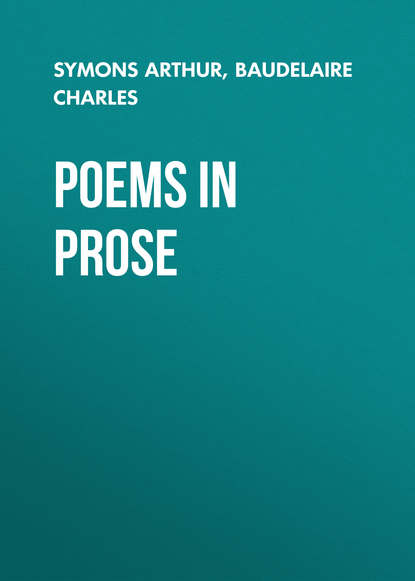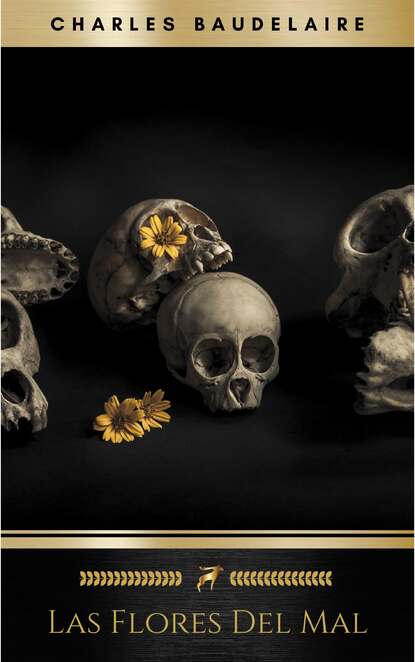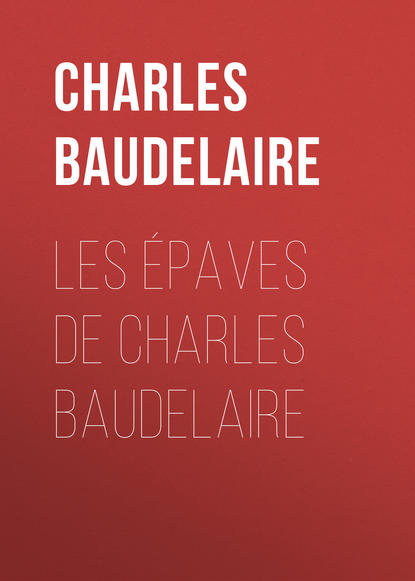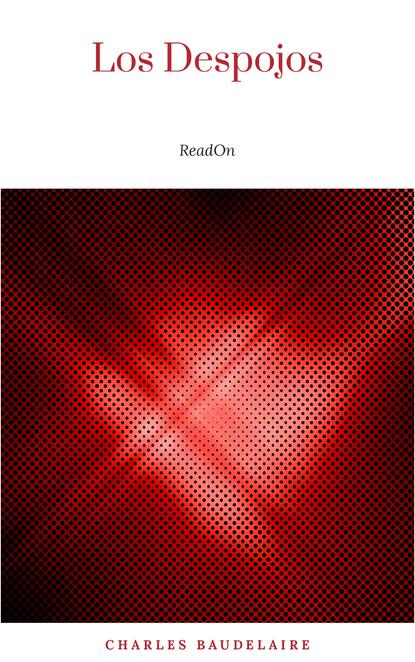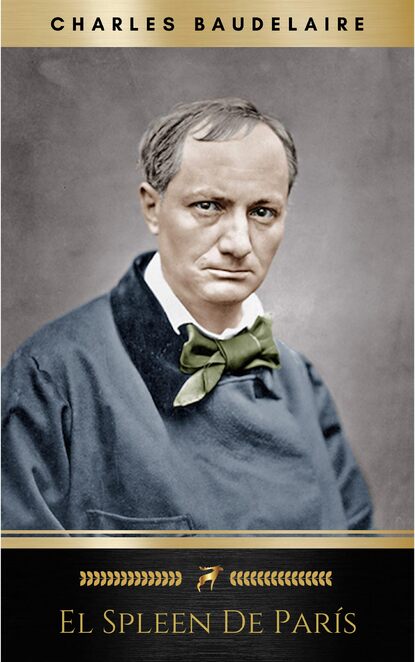 Полная версия
Полная версияПолная версия:
Charles Baudelaire The Poems and Prose Poems of Charles Baudelaire
- + Увеличить шрифт
- - Уменьшить шрифт

Charles Baudelaire
The Poems and Prose Poems of Charles Baudelaire / with an Introductory Preface by James Huneker
CHARLES BAUDELAIRE
BY JAMES HUNEKERIFor the sentimental no greater foe exists than the iconoclast who dissipates literary legends. And he is abroad nowadays. Those golden times when they gossiped of De Quincey's enormous opium consumption, of the gin absorbed by gentle Charles Lamb, of Coleridge's dark ways, Byron's escapades, and Shelley's atheism – alas! into what faded limbo have they vanished. Poe, too, whom we saw in fancy reeling from Richmond to Baltimore, Baltimore to Philadelphia, Philadelphia to New York. Those familiar fascinating anecdotes have gone the way of all such jerry-built spooks. We now know Poe to have been a man suffering at the time of his death from cerebral lesion, a man who drank at intervals and little. Dr. Guerrier of Paris has exploded a darling superstition about De Quincey's opium-eating. He has demonstrated that no man could have lived so long – De Quincey was nearly seventy-five at his death – and worked so hard, if he had consumed twelve thousand drops of laudanum as often as he said he did. Furthermore, the English essayist's description of the drug's effects is inexact. He was seldom sleepy – a sure sign, asserts Dr. Guerrier, that he was not altogether enslaved by the drug habit. Sprightly in old age, his powers of labour were prolonged until past three-score and ten. His imagination needed little opium to produce the famous Confessions. Even Gautier's revolutionary red waistcoat worn at the première of Hernani was, according to Gautier, a pink doublet. And Rousseau has been whitewashed. So they are disappearing, those literary legends, until, disheartened, we cry out: Spare us our dear, old-fashioned, disreputable men of genius!
But the legend of Charles Baudelaire is seemingly indestructible. This French poet has suffered more from the friendly malignant biographer and chroniclers than did Poe. Who shall keep the curs out of the cemetery? asked Baudelaire after he had read Griswold on Poe. A few years later his own cemetery was invaded and the world was put into possession of the Baudelaire legend; that legend of the atrabilious, irritable poet, dandy, maniac, his hair dyed green, spouting blasphemies; that grim, despairing image of a diabolic, a libertine, saint, and drunkard. Maxime du Camp was much to blame for the promulgation of these tales – witness his Souvenirs littéraires. However, it may be confessed that part of the Baudelaire legend was created by Charles Baudelaire. In the history of literature it is difficult to parallel such a deliberate piece of self-stultification. Not Villon, who preceded him, not Verlaine, who imitated him, drew for the astonishment or disedification of the world a like unflattering portrait. Mystifier as he was, he must have suffered at times from acute cortical irritation. And, notwithstanding his desperate effort to realize Poe's idea, he only proved Poe correct, who had said that no man can bare his heart quite naked; there always will be something held back, something false ostentatiously thrust forward. The grimace, the attitude, the pomp of rhetoric are so many buffers between the soul of man and the sharp reality of published confessions. Baudelaire was no more exception to this rule than St. Augustine, Bunyan, Rousseau, or Huysmans; though he was as frank as any of them, as we may see in the printed diary, Mon cœur mis à nu (Posthumous Works, Société du Mercure de France); and in the Journal, Fusées, Letters, and other fragments exhumed by devoted Baudelarians.
To smash legends, Eugène Crépet's biographical study, first printed in 1887, has been republished with new notes by his son, Jacques Crépet. This is an exceedingly valuable contribution to Baudelaire lore; a dispassionate life, however, has yet to be written, a noble task for some young poet who will disentangle the conflicting lies originated by Baudelaire – that tragic comedian – from the truth and thus save him from himself. The Crépet volume is really but a series of notes; there are some letters addressed to the poet by the distinguished men of his day, supplementing the rather disappointing volume of Letters, 1841-1866, published in 1908. There are also documents in the legal prosecution of Baudelaire, with memories of him by Charles Asselineau, Léon Cladel, Camille Lemonnier, and others.
In November, 1850, Maxime du Camp and Gustave Flaubert found themselves at the French Ambassador's, Constantinople. The two friends had taken a trip in the Orient which later bore fruit in Salammbô. General Aupick, the representative of the French Government, cordially the young men received; they were presented to his wife, Madame Aupick. She was the mother of Charles Baudelaire, and inquired rather anxiously of Du Camp: "My son has talent, has he not?" Unhappy because her second marriage, a brilliant one, had set her son against her, the poor woman welcomed from such a source confirmation of her eccentric boy's gifts. Du Camp tells the much-discussed story of a quarrel between the youthful Charles and his stepfather, a quarrel that began at table. There were guests present. After some words Charles bounded at the General's throat and sought to strangle him. He was promptly boxed on the ears and succumbed to a nervous spasm. A delightful anecdote, one that fills with joy psychiatrists in search of a theory of genius and degeneration. Charles was given some money and put on board a ship sailing to East India. He became a cattle-dealer in the British army, and returned to France years afterward with a Vénus noire, to whom he addressed extravagant poems! All this according to Du Camp. Here is another tale, a comical one. Baudelaire visited Du Camp in Paris, and his hair was violently green. Du Camp said nothing. Angered by this indifference, Baudelaire asked: "You find nothing abnormal about me?" "No," was the answer. "But my hair – it is green!" "That is not singular, mon cher Baudelaire; every one has hair more or less green in Paris." Disappointed in not creating a sensation, Baudelaire went to a café, gulped down two large bottles of Burgundy, and asked the waiter to remove the water, as water was a disagreeable sight; then he went away in a rage. It is a pity to doubt this green hair legend; presently a man of genius will not be able to enjoy an epileptic fit in peace – as does a banker or a beggar. We are told that St. Paul, Mahomet, Handel, Napoleon, Flaubert, Dostoiëvsky were epileptoids; yet we do not encounter men of this rare kind among the inmates of asylums. Even Baudelaire had his sane moments.
The joke of the green hair has been disposed of by Crépet. Baudelaire's hair thinning after an illness, he had his head shaved and painted with salve of a green hue, hoping thereby to escape baldness. At the time when he had embarked for Calcutta (May, 1841), he was not seventeen, but twenty years of age. Du Camp said he was seventeen when he attacked General Aupick. The dinner could not have taken place at Lyons because the Aupick family had left that city six years before the date given by Du Camp. Charles was provided with five thousand francs for his expenses, instead of twenty – Du Camp's version – and he never was a beef-drover in the British army, for a good reason – he never reached India. Instead, he disembarked at the Isle of Bourbon, and after a short stay suffered from homesickness and returned to France, after being absent about ten months. But, like Flaubert, on his return home Baudelaire was seized with the nostalgia of the East; over there he had yearned for Paris. Jules Claretie recalls Baudelaire saying to him with a grimace: "I love Wagner; but the music I prefer is that of a cat hung up by his tail outside of a window, and trying to stick to the panes of glass with its claws. There is an odd grating on the glass which I find at the same time strange, irritating, and singularly harmonious." Is it necessary to add that Baudelaire, notorious in Paris for his love of cats, dedicating poems to cats, would never have perpetrated such revolting cruelty?
Another misconception, a critical one, is the case of Poe and Baudelaire. The young Frenchman first became infatuated with Poe's writings in 1846 or 1847 – he gave these two dates, though several stories of Poe had been translated into French as early as 1841 or 1842; L'Orang-Outang was the first, which we know as The Murders in the Rue Morgue; Madame Meunier also adapted several Poe stories for the reviews. Baudelaire's labours as a translator lasted over ten years. That he assimilated Poe, that he idolized Poe, is a commonplace of literary gossip. But that Poe had overwhelming influence in the formation of his poetic genius is not the truth. Yet we find such an acute critic as the late Edmund Clarence Stedman writing, "Poe's chief influence upon Baudelaire's own production relates to poetry." It is precisely the reverse. Poe's influence affected Baudelaire's prose, notably in the disjointed confessions, Mon cœur mis à nu, which vaguely recall the American writer's Marginalia. The bulk in the poetry in Les Fleurs du Mal was written before Baudelaire had read Poe, though not published in book form until 1857. But in 1855 some of the poems saw the light in the Revue des deux Mondes, while many of them had been put forth a decade or fifteen years before as fugitive verse in various magazines. Stedman was not the first to make this mistake. In Bayard Taylor's The Echo Club we find on page 24 this criticism: "There was a congenital twist about Poe … Baudelaire and Swinburne after him have been trying to surpass him by increasing the dose; but his muse is the natural Pythia inheriting her convulsions, while they eat all sorts of insane roots to produce theirs." This must have been written about 1872, and after reading it one would fancy that Poe and Baudelaire were rhapsodic wrigglers on the poetic tripod, whereas their poetry is often reserved, even glacial. Baudelaire, like Poe, sometimes "built his nests with the birds of Night," and that was enough to condemn the work of both men by critics of the didactic school.
Once, when Baudelaire heard that an American man of letters(?) was in Paris, he secured an introduction and called on him. Eagerly inquiring after Poe, he learned that he was not considered a genteel person in America, Baudelaire withdrew, muttering maledictions. Enthusiastic poet! Charming literary person! Yet the American, whoever he was, represented public opinion at the time. To-day criticisms of Poe are vitiated by the desire to make him an angel. It is to be doubted whether without his barren environment and hard fortunes we should have had Poe at all. He had to dig down deep into the pit of his personality to reach the central core of his music. But every ardent young soul entering "literature" begins by a vindication of Poe's character. Poe was a man, and he is now a classic. He was a half-charlatan as was Baudelaire. In both the sublime and the sickly were never far asunder. The pair loved to mystify, to play pranks on their contemporaries. Both were implacable pessimists. Both were educated in affluence, and both had to face unprepared the hardships of life. The hastiest comparison of their poetic work will show that their only common ideal was the worship of an exotic beauty. Their artistic methods of expression were totally dissimilar. Baudelaire, like Poe, had a harp-like temperament which vibrated in the presence of strange subjects. Above all, he was obsessed by sex. Women, as angel of destruction, is the keynote of his poems. Poe was almost sexless. His aerial creatures never footed the dusty highways of the world. His lovely lines, "Helen, thy beauty is to me," could never have been written by Baudelaire; while Poe would never have pardoned the "fulgurant" grandeur, the Beethoven-like harmonies, the Dantesque horrors of that "deep wide music of lost souls" in "Femmes Damnées":
"Descendes, descendes, lamentable victimes."Or this, which might serve as a text for one of John Martin's vast sinister mezzotints:
J'ai vu parfois au fond d'un théâtre banalQu'enflammait l'orchestre sonore,Une fée allumer dans un ciel infernalUne miraculeuse aurore;J'ai vu parfois au fond d'un théâtre banalUn être, qui n'était que lumière, or et gaze,Terrasser rénorme Satan;Mais mon cœur que jamais ne visite l'extase,Est un théâtre où l'on attendToujours, toujours en vain l'Etre aux ailes de gaze.George Saintsbury thus sums up the differences between Poe and Baudelaire: "Both authors – Poe and De Quincey – fell short of Baudelaire himself as regards depth and fulness of passion, but both have a superficial likeness to him in eccentricity of temperameut and affection for a certain peculiar mixture of grotesque and horror." Poe is without passion, except a passion for the macabre; what Huysmans calls "The October of the sensations"; whereas, there is a gulf of despair and terror and humanity in Baudelaire, which shakes your nerves, yet stimulates the imagination. However, profounder as a poet, he was no match for Poe in what might be termed intellectual prestidigitation. The mathematical Poe, the Poe of the ingenious detective tales, tales extraordinary, the Poe of the swift flights into the cosmic blue, the Poe the prophet and mystic – in these the American was more versatile than his French translator. That Baudelaire said, "Evil be thou my good," is doubtless true. He proved all things and found them vanity. He is the poet of original sin, a worshipper of Satan for the sake of paradox; his Litanies to Satan ring childish to us – in his heart he was a believer. His was "an infinite reverse aspiration," and mixed up with his pose was a disgust for vice, for life itself. He was the last of the Romanticists; Sainte-Beuve called him the Kamchatka of Romanticism; its remotest hyperborean peak. Romanticism is dead to-day, as dead as Naturalism; but Baudelaire is alive, and read. His glistening phosphorescent trail is over French poetry and he is the begetter of a school: – Verlaine, Villiers de l'Isle Adam, Carducci, Arthur Rimbaud, Jules Laforgue, Gabriel D'Annunzio, Aubrey Beardsley, Verhaeren, and many of the youthful crew. He affected Swinburne, and in Huysmans, who was not a poet, his splenetic spirit lives. Baudelaire's motto might be the obverse of Browning's lines: "The Devil is in heaven. All's wrong with the world."
When Goethe said of Hugo and the Romanticists that they came from Chateaubriand, he should have substituted the name of Rousseau – "Romanticism, it is Rousseau," exclaims Pierre Lasserre. But there is more of Byron and Petrus Borel – a forgotten half-mad poet – in Baudelaire; though, for a brief period, in 1848, he became a Rousseau reactionary, sported the workingman's blouse, cut his hair, shouldered a musket, went to the barricades, wrote inflammatory editorials calling the proletarian "Brother!" (oh, Baudelaire!) and, as the Goncourts recorded in their diary, had the head of a maniac. How seriously we may take this swing of the pendulum is to be noted in a speech of the poet's at the time of the Revolution: "Come," he said, "let us go shoot General Aupick!" It was his stepfather that he thought of, not the eternal principles of Liberty. This may be a false anecdote; many such were foisted upon Baudelaire. For example, his exclamations at cafés or in public places, such as: "Have you ever eaten a baby? I find it pleasing to the palate!" or, "The night I killed my father!" Naturally, people stared and Baudelaire was happy – he had startled a bourgeois. The cannibalistic idea he may have borrowed from Swift's amusing pamphlet, for this French poet knew English literature.
Gautier compares the poems to a certain tale of Hawthorne's in which there is a garden of poisoned flowers. But Hawthorne worked in his laboratory of evil wearing mask and gloves; he never descended into the mud and sin of the street. Baudelaire ruined his health, smudged his soul, yet remained withal, as Anatole France says, "a divine poet." How childish, yet how touching is his resolution – he wrote in his diary of prayer's dynamic force – when he was penniless, in debt, threatened with imprisonment, sick, nauseated with sin: "To make every morning my prayer to God, the reservoir of all force, and all justice; to my father, to Mariette, and to Poe as intercessors." (Evidently, Maurice Barrès encountered here his theory of Intercessors.) Baudelaire loved the memory of his father as much as Stendhal hated his own. He became reconciled with his mother after the death of General Aupick, in 1857. He felt in 1862 that his own intellectual eclipse was approaching, for he wrote: "I have cultivated my hysteria with joy and terror. To-day imbecility's wing fanned me as it passed." The sense of the vertiginous gulf was abiding with him; read his poem, "Pascal avait son gouffre."
In preferring the Baudelaire translations of Poe to the original – and they give the impression of being original works – Stedman agreed with Asselineau that the French is more concise than the English. The prose of Poe and Baudelaire is clear, sober, rhythmic; Baudelaire's is more lapidary, finer in contour, richer coloured, more supple, though without the "honey and tiger's blood" of Barbey d'Aurevilly. Baudelaire's soul was patiently built up as a fabulous bird might build its nest – bits of straw, the sobbing of women, clay, cascades of black stars, rags, leaves, rotten wood, corroding dreams, a spray of roses, a sparkle of pebble, a gleam of blue sky, arabesques of incense and verdigris, despairing hearts and music and the abomination of desolation, for its ground-tones. But this soul-nest is also a cemetery of the seven sorrows. He loves the clouds … les nuages … là bas… It was là bas with him even in the tortures of his wretched love-life. Corruption and death were ever floating in his consciousness. He was like Flaubert, who saw everywhere the hidden skeleton. Félicien Hops has best interpreted Baudelaire; the etcher and poet were closely knit spirits. Rodin, too, is a Baudelarian. If there could be such an anomaly as a native wood-note wildly evil, it would be the lyric and astringent voice of this poet. His sensibility was both catholic and morbid, though he could be frigid in the face of the most disconcerting misfortunes. He was a man for whom the invisible word existed; if Gautier was pagan, Baudelaire was a strayed spirit from mediæval days. The spirit rules, and, as Paul Bourget said, "he saw God." A Manichean in his worship of evil, he nevertheless abased his soul: "Oh! Lord God! Give me the force and courage to contemplate my heart and my body without disgust," he prays: but as some one remarked to Rochefoucauld, "Where you end, Christianity begins."
Baudelaire built his ivory tower on the borders of a poetic Maremma, which every miasma of the spirit pervaded, every marsh-light and glow-worm inhabited. Like Wagner, Baudelaire painted in his sultry music the profundities of abysms, the vastness of space. He painted, too, the great nocturnal silences of the soul.
Pacem summum tenent! He never reached peace on the heights. Let us admit that souls of his kind are encased in sick frames; their steel is too shrewd for the scabbard; yet the enigma for us is none the less unfathomable. Existence for such natures is a sort of muffled delirium. To affiliate him with Poe, De Quincey, Hoffman, James Thomson, Coleridge, and the rest of the sombre choir does not explain him; he is, perhaps, nearer Donne and Villon than any of the others – strains of the metaphysical and sinister and supersubtle are to be discovered in him. The disharmony of brain and body, the spiritual bilocation, are only too easy to diagnose; but the remedy? Hypocrite lecteur – mon semblable – mon frère! When the subtlety, force, grandeur, of his poetic production be considered, together with its disquieting, nervous, vibrating qualities, it is not surprising that Victor Hugo wrote to the poet: "You invest the heaven of art with we know not what deadly rays; you create a new shudder." Hugo might have said that he turned Art into an Inferno. Baudelaire is the evil archangel of poetry. In his heaven of fire, glass and ebony he is the blazing Lucifer. "A glorious devil, large in heart and brain, that did love beauty only…" once sang Tennyson, though not of the Frenchman.
IIAs long ago as 1869, and in our "barbarous gas-lit country," as Baudelaire named the land of Poe, an unsigned review appeared in which this poet was described as "unique and as interesting as Hamlet. He is that rare and unknown being, a genuine poet – a poet in the midst of things that have disordered his spirit – a poet excessively developed in his taste for and by beauty … very responsive to the ideal, very greedy of sensation." A better description of Baudelaire does not exist The Hamlet-motive, particularly, is one that sounded throughout the disordered symphony of the poet's life.
He was, later, revealed – also reviled – to American readers by Henry James, who completely missed his significance. This was in 1878, when appeared the first edition of French Poets and Novelists. Previous to that there had been some desultory discussion, a few essays in the magazines, and in 1875 a sympathetic paper by Professor James Albert Harrison of the University of Virginia. He denounced the Frenchman for his reprehensible taste, though he did not mention his beautiful verse nor his originality in the matter of criticism. Baudelaire, in his eyes, was not only immoral, but he had, with the approbation of Sainte-Beuve, introduced Poe as a great man to the French nation. (See Baudelaire's letter to Sainte-Beuve in the newly published Letters, 1841-1866.) Perhaps "Mr. Dick Minim" and his projected Academy of Criticism might make clear these devious problems.
The Etudes Critiques of Edmond Schérer were collected in 1863. In them we find this unhappy, uncritical judgment: "Baudelaire, lui, n'a rien, ni le cœur, ni l'esprit, ni l'idée, ni le mot, ni la raison, ni la fantaisie, ni la verve, ni même la facture … son unique titre c'est d'avoir contribué à créer l'esthétique de la débauche." It is not our intention to dilate upon the injustice of this criticism. It is Baudelaire the critic of æsthetics in whom we are interested. Yet I cannot forbear saying that if all the negations of Schérer had been transformed into affirmations, only justice would have been accorded Baudelaire, who was not alone a poet, the most original of his century, but also a critic of the first rank, one who welcomed Richard Wagner when Paris hooted him and his fellow composer, Hector Berlioz, played the rôle of the envious; one who fought for Edouard Manet, Leconte de Lisle, Gustave Flaubert, Eugène Delacroix; fought with pen for the modern etchers, illustrators, Meryon, Daumier, Félicien Rops, Gavarni, and Constantin Guys. He literally identified himself with De Quincey and Poe, translating them so wonderfully well that some unpatriotic persons like the French better than the originals. So much was Baudelaire absorbed in Poe that a writer of his times asserted that the translator would meet the same fate as the American poet. A singular, vigorous spirit is Baudelaire's, whose poetry with its "icy ecstasy" is profound and harmonious, whose criticism is penetrated by a catholic quality, who anticipated modern critics in his abhorrence of schools and environments, preferring to isolate the man and uniquely study him. He would have subscribed to Swinburne's generous pronouncement: "I have never been able to see what should attract man to the profession of criticism but the noble pleasure of praising." The Frenchman has said that it would be impossible for a critic to become a poet; and it is impossible for a poet not to contain a critic.
Théophile Gautier's study prefixed to the definitive edition of Les Fleurs du Mal is not only the most sympathetic exposition of Baudelaire as man and genius, but it is also the high-water mark of Gautier's gifts as a critical essayist. We learn therein how the young Charles, an incorrigible dandy, came to visit Hôtel Pimodan about 1844. In this Hôtel Pimodan a dilettante, Ferdinand Boissard, held high revel. His fantastically decorated apartments were frequented by the painters, poets, sculptors, romancers, of the day – that is, carefully selected ones such as Liszt, George Sand, Mérimée, and others whose verve or genius gave them the privilege of saying Open Sesame! to this cave of forty Supermen. Balzac has in his Peau de Chagrin pictured the same sort of scenes which were supposed to occur weekly at the Pimodan. Gautier eloquently describes the meeting of these kindred artistic souls, where the beautiful Jewess, Maryx, who had posed for Ary Scheffer's Mignon and for Paul Delaroche's La Gloire, met the superb Madame Sabatier, the only woman that Baudelaire loved, and the original of that extraordinary group of Clésinger's – the sculptor and son-in-law of George Sand – la Femme au Serpent, a Salammbô à la mode in marble. Hasheesh was eaten, so Gautier writes, by Boissard and Baudelaire. As for the creator of Mademoiselle Maupin, he was too robust for such nonsense. He had to work for his living at journalism, and he died in harness, an irreproachable father, while the unhappy Baudelaire, the inheritor of an intense, unstable temperament, soon devoured his patrimony of 75,000 francs, and for the remaining years of his life was between the devil of his dusky Jenny Duval and the deep sea of hopeless debt.


